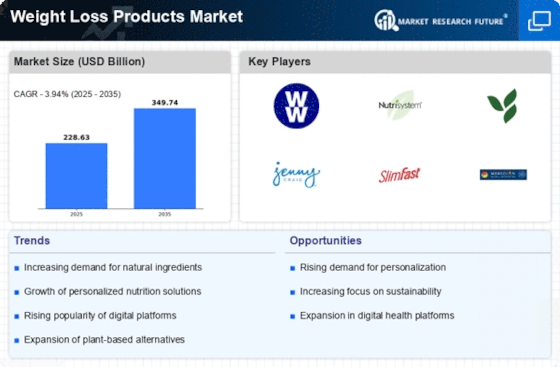-
EXECUTIVE SUMMARY
-
Market Overview
-
Key Findings
-
Market Segmentation
-
Competitive Landscape
-
Challenges and Opportunities
-
Future Outlook
-
MARKET INTRODUCTION
-
Definition
-
Scope of the study
- Research Objective
- Assumption
- Limitations
-
RESEARCH METHODOLOGY
-
Overview
-
Data Mining
-
Secondary Research
-
Primary Research
- Primary Interviews and Information Gathering Process
- Breakdown of Primary Respondents
-
Forecasting Model
-
Market Size Estimation
- Bottom-Up Approach
- Top-Down Approach
-
Data Triangulation
-
Validation
-
MARKET DYNAMICS
-
Overview
-
Drivers
-
Restraints
-
Opportunities
-
MARKET FACTOR ANALYSIS
-
Value chain Analysis
-
Porter's Five Forces Analysis
- Bargaining Power of Suppliers
- Bargaining Power of Buyers
- Threat of New Entrants
- Threat of Substitutes
- Intensity of Rivalry
-
COVID-19 Impact Analysis
- Market Impact Analysis
- Regional Impact
- Opportunity and Threat Analysis
-
Weight Loss Ingredients Market, BY PRODUCT TYPE (USD BILLION)
-
Dietary Supplements
-
Meal Replacement Products
-
Fitness Equipment
-
Weight Loss Programs
-
Weight Loss Ingredients Market, BY DISTRIBUTION CHANNEL (USD BILLION)
-
Online Retail
-
Offline Retail
-
Pharmacies
-
Health and Wellness Stores
-
Weight Loss Ingredients Market, BY FORMULATION (USD BILLION)
-
Powder
-
Capsule
-
Liquid
-
Bar
-
Weight Loss Ingredients Market, BY TARGET CONSUMER (USD BILLION)
-
Adults
-
Teens
-
Seniors
-
Athletes
-
Weight Loss Ingredients Market, BY REGIONAL (USD BILLION)
-
North America
- US
- Canada
-
Europe
- Germany
- UK
- France
- Russia
- Italy
- Spain
- Rest of Europe
-
APAC
- China
- India
- Japan
- South Korea
- Malaysia
- Thailand
- Indonesia
- Rest of APAC
-
South America
- Brazil
- Mexico
- Argentina
- Rest of South America
-
MEA
- GCC Countries
- South Africa
- Rest of MEA
-
COMPETITIVE LANDSCAPE
-
Overview
-
Competitive Analysis
-
Market share Analysis
-
Major Growth Strategy in the Weight Loss Products Market
-
Competitive Benchmarking
-
Leading Players in Terms of Number of Developments in the Weight Loss Products Market
-
Key developments and growth strategies
- New Product Launch/Service Deployment
- Merger & Acquisitions
- Joint Ventures
-
Major Players Financial Matrix
- Sales and Operating Income
- Major Players R&D Expenditure. 2023
-
COMPANY PROFILES
-
Noom
- Financial Overview
- Products Offered
- Key Developments
- SWOT Analysis
- Key Strategies
-
Yoli
- Financial Overview
- Products Offered
- Key Developments
- SWOT Analysis
- Key Strategies
-
MyFitnessPal
- Financial Overview
- Products Offered
- Key Developments
- SWOT Analysis
- Key Strategies
-
GNC Holdings
- Financial Overview
- Products Offered
- Key Developments
- SWOT Analysis
- Key Strategies
-
Bariatric Fusion
- Financial Overview
- Products Offered
- Key Developments
- SWOT Analysis
- Key Strategies
-
Diet Direct
- Financial Overview
- Products Offered
- Key Developments
- SWOT Analysis
- Key Strategies
-
Herbalife
- Financial Overview
- Products Offered
- Key Developments
- SWOT Analysis
- Key Strategies
-
Weight Watchers
- Financial Overview
- Products Offered
- Key Developments
- SWOT Analysis
- Key Strategies
-
LeanBiome
- Financial Overview
- Products Offered
- Key Developments
- SWOT Analysis
- Key Strategies
-
Medifast
- Financial Overview
- Products Offered
- Key Developments
- SWOT Analysis
- Key Strategies
-
VLCD
- Financial Overview
- Products Offered
- Key Developments
- SWOT Analysis
- Key Strategies
-
Nutrisystem
- Financial Overview
- Products Offered
- Key Developments
- SWOT Analysis
- Key Strategies
-
Atkins Nutritionals
- Financial Overview
- Products Offered
- Key Developments
- SWOT Analysis
- Key Strategies
-
SlimFast
- Financial Overview
- Products Offered
- Key Developments
- SWOT Analysis
- Key Strategies
-
Isagenix
- Financial Overview
- Products Offered
- Key Developments
- SWOT Analysis
- Key Strategies
-
APPENDIX
-
References
-
Related Reports
-
LIST OF TABLES
-
LIST OF ASSUMPTIONS
-
NORTH AMERICA WEIGHT LOSS PRODUCTS MARKET SIZE ESTIMATES & Weight Loss Ingredients Market, BY PRODUCT TYPE, 2019-2035 (USD BILLIONS)
-
NORTH AMERICA WEIGHT LOSS PRODUCTS MARKET SIZE ESTIMATES & Weight Loss Ingredients Market, BY DISTRIBUTION CHANNEL, 2019-2035 (USD BILLIONS)
-
NORTH AMERICA WEIGHT LOSS PRODUCTS MARKET SIZE ESTIMATES & Weight Loss Ingredients Market, BY FORMULATION, 2019-2035 (USD BILLIONS)
-
NORTH AMERICA WEIGHT LOSS PRODUCTS MARKET SIZE ESTIMATES & Weight Loss Ingredients Market, BY TARGET CONSUMER, 2019-2035 (USD BILLIONS)
-
NORTH AMERICA WEIGHT LOSS PRODUCTS MARKET SIZE ESTIMATES & Weight Loss Ingredients Market, BY REGIONAL, 2019-2035 (USD BILLIONS)
-
US WEIGHT LOSS PRODUCTS MARKET SIZE ESTIMATES & Weight Loss Ingredients Market, BY PRODUCT TYPE, 2019-2035 (USD BILLIONS)
-
US WEIGHT LOSS PRODUCTS MARKET SIZE ESTIMATES & Weight Loss Ingredients Market, BY DISTRIBUTION CHANNEL, 2019-2035 (USD BILLIONS)
-
US WEIGHT LOSS PRODUCTS MARKET SIZE ESTIMATES & Weight Loss Ingredients Market, BY FORMULATION, 2019-2035 (USD BILLIONS)
-
US WEIGHT LOSS PRODUCTS MARKET SIZE ESTIMATES & Weight Loss Ingredients Market, BY TARGET CONSUMER, 2019-2035 (USD BILLIONS)
-
US WEIGHT LOSS PRODUCTS MARKET SIZE ESTIMATES & Weight Loss Ingredients Market, BY REGIONAL, 2019-2035 (USD BILLIONS)
-
CANADA WEIGHT LOSS PRODUCTS MARKET SIZE ESTIMATES & Weight Loss Ingredients Market, BY PRODUCT TYPE, 2019-2035 (USD BILLIONS)
-
CANADA WEIGHT LOSS PRODUCTS MARKET SIZE ESTIMATES & Weight Loss Ingredients Market, BY DISTRIBUTION CHANNEL, 2019-2035 (USD BILLIONS)
-
CANADA WEIGHT LOSS PRODUCTS MARKET SIZE ESTIMATES & Weight Loss Ingredients Market, BY FORMULATION, 2019-2035 (USD BILLIONS)
-
CANADA WEIGHT LOSS PRODUCTS MARKET SIZE ESTIMATES & Weight Loss Ingredients Market, BY TARGET CONSUMER, 2019-2035 (USD BILLIONS)
-
CANADA WEIGHT LOSS PRODUCTS MARKET SIZE ESTIMATES & Weight Loss Ingredients Market, BY REGIONAL, 2019-2035 (USD BILLIONS)
-
EUROPE WEIGHT LOSS PRODUCTS MARKET SIZE ESTIMATES & Weight Loss Ingredients Market, BY PRODUCT TYPE, 2019-2035 (USD BILLIONS)
-
EUROPE WEIGHT LOSS PRODUCTS MARKET SIZE ESTIMATES & Weight Loss Ingredients Market, BY DISTRIBUTION CHANNEL, 2019-2035 (USD BILLIONS)
-
EUROPE WEIGHT LOSS PRODUCTS MARKET SIZE ESTIMATES & Weight Loss Ingredients Market, BY FORMULATION, 2019-2035 (USD BILLIONS)
-
EUROPE WEIGHT LOSS PRODUCTS MARKET SIZE ESTIMATES & Weight Loss Ingredients Market, BY TARGET CONSUMER, 2019-2035 (USD BILLIONS)
-
EUROPE WEIGHT LOSS PRODUCTS MARKET SIZE ESTIMATES & Weight Loss Ingredients Market, BY REGIONAL, 2019-2035 (USD BILLIONS)
-
GERMANY WEIGHT LOSS PRODUCTS MARKET SIZE ESTIMATES & Weight Loss Ingredients Market, BY PRODUCT TYPE, 2019-2035 (USD BILLIONS)
-
GERMANY WEIGHT LOSS PRODUCTS MARKET SIZE ESTIMATES & Weight Loss Ingredients Market, BY DISTRIBUTION CHANNEL, 2019-2035 (USD BILLIONS)
-
GERMANY WEIGHT LOSS PRODUCTS MARKET SIZE ESTIMATES & Weight Loss Ingredients Market, BY FORMULATION, 2019-2035 (USD BILLIONS)
-
GERMANY WEIGHT LOSS PRODUCTS MARKET SIZE ESTIMATES & Weight Loss Ingredients Market, BY TARGET CONSUMER, 2019-2035 (USD BILLIONS)
-
GERMANY WEIGHT LOSS PRODUCTS MARKET SIZE ESTIMATES & Weight Loss Ingredients Market, BY REGIONAL, 2019-2035 (USD BILLIONS)
-
UK WEIGHT LOSS PRODUCTS MARKET SIZE ESTIMATES & Weight Loss Ingredients Market, BY PRODUCT TYPE, 2019-2035 (USD BILLIONS)
-
UK WEIGHT LOSS PRODUCTS MARKET SIZE ESTIMATES & Weight Loss Ingredients Market, BY DISTRIBUTION CHANNEL, 2019-2035 (USD BILLIONS)
-
UK WEIGHT LOSS PRODUCTS MARKET SIZE ESTIMATES & Weight Loss Ingredients Market, BY FORMULATION, 2019-2035 (USD BILLIONS)
-
UK WEIGHT LOSS PRODUCTS MARKET SIZE ESTIMATES & Weight Loss Ingredients Market, BY TARGET CONSUMER, 2019-2035 (USD BILLIONS)
-
UK WEIGHT LOSS PRODUCTS MARKET SIZE ESTIMATES & Weight Loss Ingredients Market, BY REGIONAL, 2019-2035 (USD BILLIONS)
-
FRANCE WEIGHT LOSS PRODUCTS MARKET SIZE ESTIMATES & Weight Loss Ingredients Market, BY PRODUCT TYPE, 2019-2035 (USD BILLIONS)
-
FRANCE WEIGHT LOSS PRODUCTS MARKET SIZE ESTIMATES & Weight Loss Ingredients Market, BY DISTRIBUTION CHANNEL, 2019-2035 (USD BILLIONS)
-
FRANCE WEIGHT LOSS PRODUCTS MARKET SIZE ESTIMATES & Weight Loss Ingredients Market, BY FORMULATION, 2019-2035 (USD BILLIONS)
-
FRANCE WEIGHT LOSS PRODUCTS MARKET SIZE ESTIMATES & Weight Loss Ingredients Market, BY TARGET CONSUMER, 2019-2035 (USD BILLIONS)
-
FRANCE WEIGHT LOSS PRODUCTS MARKET SIZE ESTIMATES & Weight Loss Ingredients Market, BY REGIONAL, 2019-2035 (USD BILLIONS)
-
RUSSIA WEIGHT LOSS PRODUCTS MARKET SIZE ESTIMATES & Weight Loss Ingredients Market, BY PRODUCT TYPE, 2019-2035 (USD BILLIONS)
-
RUSSIA WEIGHT LOSS PRODUCTS MARKET SIZE ESTIMATES & Weight Loss Ingredients Market, BY DISTRIBUTION CHANNEL, 2019-2035 (USD BILLIONS)
-
RUSSIA WEIGHT LOSS PRODUCTS MARKET SIZE ESTIMATES & Weight Loss Ingredients Market, BY FORMULATION, 2019-2035 (USD BILLIONS)
-
RUSSIA WEIGHT LOSS PRODUCTS MARKET SIZE ESTIMATES & Weight Loss Ingredients Market, BY TARGET CONSUMER, 2019-2035 (USD BILLIONS)
-
RUSSIA WEIGHT LOSS PRODUCTS MARKET SIZE ESTIMATES & Weight Loss Ingredients Market, BY REGIONAL, 2019-2035 (USD BILLIONS)
-
ITALY WEIGHT LOSS PRODUCTS MARKET SIZE ESTIMATES & Weight Loss Ingredients Market, BY PRODUCT TYPE, 2019-2035 (USD BILLIONS)
-
ITALY WEIGHT LOSS PRODUCTS MARKET SIZE ESTIMATES & Weight Loss Ingredients Market, BY DISTRIBUTION CHANNEL, 2019-2035 (USD BILLIONS)
-
ITALY WEIGHT LOSS PRODUCTS MARKET SIZE ESTIMATES & Weight Loss Ingredients Market, BY FORMULATION, 2019-2035 (USD BILLIONS)
-
ITALY WEIGHT LOSS PRODUCTS MARKET SIZE ESTIMATES & Weight Loss Ingredients Market, BY TARGET CONSUMER, 2019-2035 (USD BILLIONS)
-
ITALY WEIGHT LOSS PRODUCTS MARKET SIZE ESTIMATES & Weight Loss Ingredients Market, BY REGIONAL, 2019-2035 (USD BILLIONS)
-
SPAIN WEIGHT LOSS PRODUCTS MARKET SIZE ESTIMATES & Weight Loss Ingredients Market, BY PRODUCT TYPE, 2019-2035 (USD BILLIONS)
-
SPAIN WEIGHT LOSS PRODUCTS MARKET SIZE ESTIMATES & Weight Loss Ingredients Market, BY DISTRIBUTION CHANNEL, 2019-2035 (USD BILLIONS)
-
SPAIN WEIGHT LOSS PRODUCTS MARKET SIZE ESTIMATES & Weight Loss Ingredients Market, BY FORMULATION, 2019-2035 (USD BILLIONS)
-
SPAIN WEIGHT LOSS PRODUCTS MARKET SIZE ESTIMATES & Weight Loss Ingredients Market, BY TARGET CONSUMER, 2019-2035 (USD BILLIONS)
-
SPAIN WEIGHT LOSS PRODUCTS MARKET SIZE ESTIMATES & Weight Loss Ingredients Market, BY REGIONAL, 2019-2035 (USD BILLIONS)
-
REST OF EUROPE WEIGHT LOSS PRODUCTS MARKET SIZE ESTIMATES & Weight Loss Ingredients Market, BY PRODUCT TYPE, 2019-2035 (USD BILLIONS)
-
REST OF EUROPE WEIGHT LOSS PRODUCTS MARKET SIZE ESTIMATES & Weight Loss Ingredients Market, BY DISTRIBUTION CHANNEL, 2019-2035 (USD BILLIONS)
-
REST OF EUROPE WEIGHT LOSS PRODUCTS MARKET SIZE ESTIMATES & Weight Loss Ingredients Market, BY FORMULATION, 2019-2035 (USD BILLIONS)
-
REST OF EUROPE WEIGHT LOSS PRODUCTS MARKET SIZE ESTIMATES & Weight Loss Ingredients Market, BY TARGET CONSUMER, 2019-2035 (USD BILLIONS)
-
REST OF EUROPE WEIGHT LOSS PRODUCTS MARKET SIZE ESTIMATES & Weight Loss Ingredients Market, BY REGIONAL, 2019-2035 (USD BILLIONS)
-
APAC WEIGHT LOSS PRODUCTS MARKET SIZE ESTIMATES & Weight Loss Ingredients Market, BY PRODUCT TYPE, 2019-2035 (USD BILLIONS)
-
APAC WEIGHT LOSS PRODUCTS MARKET SIZE ESTIMATES & Weight Loss Ingredients Market, BY DISTRIBUTION CHANNEL, 2019-2035 (USD BILLIONS)
-
APAC WEIGHT LOSS PRODUCTS MARKET SIZE ESTIMATES & Weight Loss Ingredients Market, BY FORMULATION, 2019-2035 (USD BILLIONS)
-
APAC WEIGHT LOSS PRODUCTS MARKET SIZE ESTIMATES & Weight Loss Ingredients Market, BY TARGET CONSUMER, 2019-2035 (USD BILLIONS)
-
APAC WEIGHT LOSS PRODUCTS MARKET SIZE ESTIMATES & Weight Loss Ingredients Market, BY REGIONAL, 2019-2035 (USD BILLIONS)
-
CHINA WEIGHT LOSS PRODUCTS MARKET SIZE ESTIMATES & Weight Loss Ingredients Market, BY PRODUCT TYPE, 2019-2035 (USD BILLIONS)
-
CHINA WEIGHT LOSS PRODUCTS MARKET SIZE ESTIMATES & Weight Loss Ingredients Market, BY DISTRIBUTION CHANNEL, 2019-2035 (USD BILLIONS)
-
CHINA WEIGHT LOSS PRODUCTS MARKET SIZE ESTIMATES & Weight Loss Ingredients Market, BY FORMULATION, 2019-2035 (USD BILLIONS)
-
CHINA WEIGHT LOSS PRODUCTS MARKET SIZE ESTIMATES & Weight Loss Ingredients Market, BY TARGET CONSUMER, 2019-2035 (USD BILLIONS)
-
CHINA WEIGHT LOSS PRODUCTS MARKET SIZE ESTIMATES & Weight Loss Ingredients Market, BY REGIONAL, 2019-2035 (USD BILLIONS)
-
INDIA WEIGHT LOSS PRODUCTS MARKET SIZE ESTIMATES & Weight Loss Ingredients Market, BY PRODUCT TYPE, 2019-2035 (USD BILLIONS)
-
INDIA WEIGHT LOSS PRODUCTS MARKET SIZE ESTIMATES & Weight Loss Ingredients Market, BY DISTRIBUTION CHANNEL, 2019-2035 (USD BILLIONS)
-
INDIA WEIGHT LOSS PRODUCTS MARKET SIZE ESTIMATES & Weight Loss Ingredients Market, BY FORMULATION, 2019-2035 (USD BILLIONS)
-
INDIA WEIGHT LOSS PRODUCTS MARKET SIZE ESTIMATES & Weight Loss Ingredients Market, BY TARGET CONSUMER, 2019-2035 (USD BILLIONS)
-
INDIA WEIGHT LOSS PRODUCTS MARKET SIZE ESTIMATES & Weight Loss Ingredients Market, BY REGIONAL, 2019-2035 (USD BILLIONS)
-
JAPAN WEIGHT LOSS PRODUCTS MARKET SIZE ESTIMATES & Weight Loss Ingredients Market, BY PRODUCT TYPE, 2019-2035 (USD BILLIONS)
-
JAPAN WEIGHT LOSS PRODUCTS MARKET SIZE ESTIMATES & Weight Loss Ingredients Market, BY DISTRIBUTION CHANNEL, 2019-2035 (USD BILLIONS)
-
JAPAN WEIGHT LOSS PRODUCTS MARKET SIZE ESTIMATES & Weight Loss Ingredients Market, BY FORMULATION, 2019-2035 (USD BILLIONS)
-
JAPAN WEIGHT LOSS PRODUCTS MARKET SIZE ESTIMATES & Weight Loss Ingredients Market, BY TARGET CONSUMER, 2019-2035 (USD BILLIONS)
-
JAPAN WEIGHT LOSS PRODUCTS MARKET SIZE ESTIMATES & Weight Loss Ingredients Market, BY REGIONAL, 2019-2035 (USD BILLIONS)
-
SOUTH KOREA WEIGHT LOSS PRODUCTS MARKET SIZE ESTIMATES & Weight Loss Ingredients Market, BY PRODUCT TYPE, 2019-2035 (USD BILLIONS)
-
SOUTH KOREA WEIGHT LOSS PRODUCTS MARKET SIZE ESTIMATES & Weight Loss Ingredients Market, BY DISTRIBUTION CHANNEL, 2019-2035 (USD BILLIONS)
-
SOUTH KOREA WEIGHT LOSS PRODUCTS MARKET SIZE ESTIMATES & Weight Loss Ingredients Market, BY FORMULATION, 2019-2035 (USD BILLIONS)
-
SOUTH KOREA WEIGHT LOSS PRODUCTS MARKET SIZE ESTIMATES & Weight Loss Ingredients Market, BY TARGET CONSUMER, 2019-2035 (USD BILLIONS)
-
SOUTH KOREA WEIGHT LOSS PRODUCTS MARKET SIZE ESTIMATES & Weight Loss Ingredients Market, BY REGIONAL, 2019-2035 (USD BILLIONS)
-
MALAYSIA WEIGHT LOSS PRODUCTS MARKET SIZE ESTIMATES & Weight Loss Ingredients Market, BY PRODUCT TYPE, 2019-2035 (USD BILLIONS)
-
MALAYSIA WEIGHT LOSS PRODUCTS MARKET SIZE ESTIMATES & Weight Loss Ingredients Market, BY DISTRIBUTION CHANNEL, 2019-2035 (USD BILLIONS)
-
MALAYSIA WEIGHT LOSS PRODUCTS MARKET SIZE ESTIMATES & Weight Loss Ingredients Market, BY FORMULATION, 2019-2035 (USD BILLIONS)
-
MALAYSIA WEIGHT LOSS PRODUCTS MARKET SIZE ESTIMATES & Weight Loss Ingredients Market, BY TARGET CONSUMER, 2019-2035 (USD BILLIONS)
-
MALAYSIA WEIGHT LOSS PRODUCTS MARKET SIZE ESTIMATES & Weight Loss Ingredients Market, BY REGIONAL, 2019-2035 (USD BILLIONS)
-
THAILAND WEIGHT LOSS PRODUCTS MARKET SIZE ESTIMATES & Weight Loss Ingredients Market, BY PRODUCT TYPE, 2019-2035 (USD BILLIONS)
-
THAILAND WEIGHT LOSS PRODUCTS MARKET SIZE ESTIMATES & Weight Loss Ingredients Market, BY DISTRIBUTION CHANNEL, 2019-2035 (USD BILLIONS)
-
THAILAND WEIGHT LOSS PRODUCTS MARKET SIZE ESTIMATES & Weight Loss Ingredients Market, BY FORMULATION, 2019-2035 (USD BILLIONS)
-
THAILAND WEIGHT LOSS PRODUCTS MARKET SIZE ESTIMATES & Weight Loss Ingredients Market, BY TARGET CONSUMER, 2019-2035 (USD BILLIONS)
-
THAILAND WEIGHT LOSS PRODUCTS MARKET SIZE ESTIMATES & Weight Loss Ingredients Market, BY REGIONAL, 2019-2035 (USD BILLIONS)
-
INDONESIA WEIGHT LOSS PRODUCTS MARKET SIZE ESTIMATES & Weight Loss Ingredients Market, BY PRODUCT TYPE, 2019-2035 (USD BILLIONS)
-
INDONESIA WEIGHT LOSS PRODUCTS MARKET SIZE ESTIMATES & Weight Loss Ingredients Market, BY DISTRIBUTION CHANNEL, 2019-2035 (USD BILLIONS)
-
INDONESIA WEIGHT LOSS PRODUCTS MARKET SIZE ESTIMATES & Weight Loss Ingredients Market, BY FORMULATION, 2019-2035 (USD BILLIONS)
-
INDONESIA WEIGHT LOSS PRODUCTS MARKET SIZE ESTIMATES & Weight Loss Ingredients Market, BY TARGET CONSUMER, 2019-2035 (USD BILLIONS)
-
INDONESIA WEIGHT LOSS PRODUCTS MARKET SIZE ESTIMATES & Weight Loss Ingredients Market, BY REGIONAL, 2019-2035 (USD BILLIONS)
-
REST OF APAC WEIGHT LOSS PRODUCTS MARKET SIZE ESTIMATES & Weight Loss Ingredients Market, BY PRODUCT TYPE, 2019-2035 (USD BILLIONS)
-
REST OF APAC WEIGHT LOSS PRODUCTS MARKET SIZE ESTIMATES & Weight Loss Ingredients Market, BY DISTRIBUTION CHANNEL, 2019-2035 (USD BILLIONS)
-
REST OF APAC WEIGHT LOSS PRODUCTS MARKET SIZE ESTIMATES & Weight Loss Ingredients Market, BY FORMULATION, 2019-2035 (USD BILLIONS)
-
REST OF APAC WEIGHT LOSS PRODUCTS MARKET SIZE ESTIMATES & Weight Loss Ingredients Market, BY TARGET CONSUMER, 2019-2035 (USD BILLIONS)
-
REST OF APAC WEIGHT LOSS PRODUCTS MARKET SIZE ESTIMATES & Weight Loss Ingredients Market, BY REGIONAL, 2019-2035 (USD BILLIONS)
-
SOUTH AMERICA WEIGHT LOSS PRODUCTS MARKET SIZE ESTIMATES & Weight Loss Ingredients Market, BY PRODUCT TYPE, 2019-2035 (USD BILLIONS)
-
SOUTH AMERICA WEIGHT LOSS PRODUCTS MARKET SIZE ESTIMATES & Weight Loss Ingredients Market, BY DISTRIBUTION CHANNEL, 2019-2035 (USD BILLIONS)
-
SOUTH AMERICA WEIGHT LOSS PRODUCTS MARKET SIZE ESTIMATES & Weight Loss Ingredients Market, BY FORMULATION, 2019-2035 (USD BILLIONS)
-
SOUTH AMERICA WEIGHT LOSS PRODUCTS MARKET SIZE ESTIMATES & Weight Loss Ingredients Market, BY TARGET CONSUMER, 2019-2035 (USD BILLIONS)
-
SOUTH AMERICA WEIGHT LOSS PRODUCTS MARKET SIZE ESTIMATES & Weight Loss Ingredients Market, BY REGIONAL, 2019-2035 (USD BILLIONS)
-
BRAZIL WEIGHT LOSS PRODUCTS MARKET SIZE ESTIMATES & Weight Loss Ingredients Market, BY PRODUCT TYPE, 2019-2035 (USD BILLIONS)
-
BRAZIL WEIGHT LOSS PRODUCTS MARKET SIZE ESTIMATES & Weight Loss Ingredients Market, BY DISTRIBUTION CHANNEL, 2019-2035 (USD BILLIONS)
-
BRAZIL WEIGHT LOSS PRODUCTS MARKET SIZE ESTIMATES & Weight Loss Ingredients Market, BY FORMULATION, 2019-2035 (USD BILLIONS)
-
BRAZIL WEIGHT LOSS PRODUCTS MARKET SIZE ESTIMATES & Weight Loss Ingredients Market, BY TARGET CONSUMER, 2019-2035 (USD BILLIONS)
-
BRAZIL WEIGHT LOSS PRODUCTS MARKET SIZE ESTIMATES & Weight Loss Ingredients Market, BY REGIONAL, 2019-2035 (USD BILLIONS)
-
MEXICO WEIGHT LOSS PRODUCTS MARKET SIZE ESTIMATES & Weight Loss Ingredients Market, BY PRODUCT TYPE, 2019-2035 (USD BILLIONS)
-
MEXICO WEIGHT LOSS PRODUCTS MARKET SIZE ESTIMATES & Weight Loss Ingredients Market, BY DISTRIBUTION CHANNEL, 2019-2035 (USD BILLIONS)
-
MEXICO WEIGHT LOSS PRODUCTS MARKET SIZE ESTIMATES & Weight Loss Ingredients Market, BY FORMULATION, 2019-2035 (USD BILLIONS)
-
MEXICO WEIGHT LOSS PRODUCTS MARKET SIZE ESTIMATES & Weight Loss Ingredients Market, BY TARGET CONSUMER, 2019-2035 (USD BILLIONS)
-
MEXICO WEIGHT LOSS PRODUCTS MARKET SIZE ESTIMATES & Weight Loss Ingredients Market, BY REGIONAL, 2019-2035 (USD BILLIONS)
-
ARGENTINA WEIGHT LOSS PRODUCTS MARKET SIZE ESTIMATES & Weight Loss Ingredients Market, BY PRODUCT TYPE, 2019-2035 (USD BILLIONS)
-
ARGENTINA WEIGHT LOSS PRODUCTS MARKET SIZE ESTIMATES & Weight Loss Ingredients Market, BY DISTRIBUTION CHANNEL, 2019-2035 (USD BILLIONS)
-
ARGENTINA WEIGHT LOSS PRODUCTS MARKET SIZE ESTIMATES & Weight Loss Ingredients Market, BY FORMULATION, 2019-2035 (USD BILLIONS)
-
ARGENTINA WEIGHT LOSS PRODUCTS MARKET SIZE ESTIMATES & Weight Loss Ingredients Market, BY TARGET CONSUMER, 2019-2035 (USD BILLIONS)
-
ARGENTINA WEIGHT LOSS PRODUCTS MARKET SIZE ESTIMATES & Weight Loss Ingredients Market, BY REGIONAL, 2019-2035 (USD BILLIONS)
-
REST OF SOUTH AMERICA WEIGHT LOSS PRODUCTS MARKET SIZE ESTIMATES & Weight Loss Ingredients Market, BY PRODUCT TYPE, 2019-2035 (USD BILLIONS)
-
REST OF SOUTH AMERICA WEIGHT LOSS PRODUCTS MARKET SIZE ESTIMATES & Weight Loss Ingredients Market, BY DISTRIBUTION CHANNEL, 2019-2035 (USD BILLIONS)
-
REST OF SOUTH AMERICA WEIGHT LOSS PRODUCTS MARKET SIZE ESTIMATES & Weight Loss Ingredients Market, BY FORMULATION, 2019-2035 (USD BILLIONS)
-
REST OF SOUTH AMERICA WEIGHT LOSS PRODUCTS MARKET SIZE ESTIMATES & Weight Loss Ingredients Market, BY TARGET CONSUMER, 2019-2035 (USD BILLIONS)
-
REST OF SOUTH AMERICA WEIGHT LOSS PRODUCTS MARKET SIZE ESTIMATES & Weight Loss Ingredients Market, BY REGIONAL, 2019-2035 (USD BILLIONS)
-
MEA WEIGHT LOSS PRODUCTS MARKET SIZE ESTIMATES & Weight Loss Ingredients Market, BY PRODUCT TYPE, 2019-2035 (USD BILLIONS)
-
MEA WEIGHT LOSS PRODUCTS MARKET SIZE ESTIMATES & Weight Loss Ingredients Market, BY DISTRIBUTION CHANNEL, 2019-2035 (USD BILLIONS)
-
MEA WEIGHT LOSS PRODUCTS MARKET SIZE ESTIMATES & Weight Loss Ingredients Market, BY FORMULATION, 2019-2035 (USD BILLIONS)
-
MEA WEIGHT LOSS PRODUCTS MARKET SIZE ESTIMATES & Weight Loss Ingredients Market, BY TARGET CONSUMER, 2019-2035 (USD BILLIONS)
-
MEA WEIGHT LOSS PRODUCTS MARKET SIZE ESTIMATES & Weight Loss Ingredients Market, BY REGIONAL, 2019-2035 (USD BILLIONS)
-
GCC COUNTRIES WEIGHT LOSS PRODUCTS MARKET SIZE ESTIMATES & Weight Loss Ingredients Market, BY PRODUCT TYPE, 2019-2035 (USD BILLIONS)
-
GCC COUNTRIES WEIGHT LOSS PRODUCTS MARKET SIZE ESTIMATES & Weight Loss Ingredients Market, BY DISTRIBUTION CHANNEL, 2019-2035 (USD BILLIONS)
-
GCC COUNTRIES WEIGHT LOSS PRODUCTS MARKET SIZE ESTIMATES & Weight Loss Ingredients Market, BY FORMULATION, 2019-2035 (USD BILLIONS)
-
GCC COUNTRIES WEIGHT LOSS PRODUCTS MARKET SIZE ESTIMATES & Weight Loss Ingredients Market, BY TARGET CONSUMER, 2019-2035 (USD BILLIONS)
-
GCC COUNTRIES WEIGHT LOSS PRODUCTS MARKET SIZE ESTIMATES & Weight Loss Ingredients Market, BY REGIONAL, 2019-2035 (USD BILLIONS)
-
SOUTH AFRICA WEIGHT LOSS PRODUCTS MARKET SIZE ESTIMATES & Weight Loss Ingredients Market, BY PRODUCT TYPE, 2019-2035 (USD BILLIONS)
-
SOUTH AFRICA WEIGHT LOSS PRODUCTS MARKET SIZE ESTIMATES & Weight Loss Ingredients Market, BY DISTRIBUTION CHANNEL, 2019-2035 (USD BILLIONS)
-
SOUTH AFRICA WEIGHT LOSS PRODUCTS MARKET SIZE ESTIMATES & Weight Loss Ingredients Market, BY FORMULATION, 2019-2035 (USD BILLIONS)
-
SOUTH AFRICA WEIGHT LOSS PRODUCTS MARKET SIZE ESTIMATES & Weight Loss Ingredients Market, BY TARGET CONSUMER, 2019-2035 (USD BILLIONS)
-
SOUTH AFRICA WEIGHT LOSS PRODUCTS MARKET SIZE ESTIMATES & Weight Loss Ingredients Market, BY REGIONAL, 2019-2035 (USD BILLIONS)
-
REST OF MEA WEIGHT LOSS PRODUCTS MARKET SIZE ESTIMATES & Weight Loss Ingredients Market, BY PRODUCT TYPE, 2019-2035 (USD BILLIONS)
-
REST OF MEA WEIGHT LOSS PRODUCTS MARKET SIZE ESTIMATES & Weight Loss Ingredients Market, BY DISTRIBUTION CHANNEL, 2019-2035 (USD BILLIONS)
-
REST OF MEA WEIGHT LOSS PRODUCTS MARKET SIZE ESTIMATES & Weight Loss Ingredients Market, BY FORMULATION, 2019-2035 (USD BILLIONS)
-
REST OF MEA WEIGHT LOSS PRODUCTS MARKET SIZE ESTIMATES & Weight Loss Ingredients Market, BY TARGET CONSUMER, 2019-2035 (USD BILLIONS)
-
REST OF MEA WEIGHT LOSS PRODUCTS MARKET SIZE ESTIMATES & Weight Loss Ingredients Market, BY REGIONAL, 2019-2035 (USD BILLIONS)
-
PRODUCT LAUNCH/PRODUCT DEVELOPMENT/APPROVAL
-
ACQUISITION/PARTNERSHIP
-
LIST OF FIGURES
-
MARKET SYNOPSIS
-
NORTH AMERICA WEIGHT LOSS PRODUCTS MARKET ANALYSIS
-
US WEIGHT LOSS PRODUCTS MARKET ANALYSIS BY PRODUCT TYPE
-
US WEIGHT LOSS PRODUCTS MARKET ANALYSIS BY DISTRIBUTION CHANNEL
-
US WEIGHT LOSS PRODUCTS MARKET ANALYSIS BY FORMULATION
-
US WEIGHT LOSS PRODUCTS MARKET ANALYSIS BY TARGET CONSUMER
-
US WEIGHT LOSS PRODUCTS MARKET ANALYSIS BY REGIONAL
-
CANADA WEIGHT LOSS PRODUCTS MARKET ANALYSIS BY PRODUCT TYPE
-
CANADA WEIGHT LOSS PRODUCTS MARKET ANALYSIS BY DISTRIBUTION CHANNEL
-
CANADA WEIGHT LOSS PRODUCTS MARKET ANALYSIS BY FORMULATION
-
CANADA WEIGHT LOSS PRODUCTS MARKET ANALYSIS BY TARGET CONSUMER
-
CANADA WEIGHT LOSS PRODUCTS MARKET ANALYSIS BY REGIONAL
-
EUROPE WEIGHT LOSS PRODUCTS MARKET ANALYSIS
-
GERMANY WEIGHT LOSS PRODUCTS MARKET ANALYSIS BY PRODUCT TYPE
-
GERMANY WEIGHT LOSS PRODUCTS MARKET ANALYSIS BY DISTRIBUTION CHANNEL
-
GERMANY WEIGHT LOSS PRODUCTS MARKET ANALYSIS BY FORMULATION
-
GERMANY WEIGHT LOSS PRODUCTS MARKET ANALYSIS BY TARGET CONSUMER
-
GERMANY WEIGHT LOSS PRODUCTS MARKET ANALYSIS BY REGIONAL
-
UK WEIGHT LOSS PRODUCTS MARKET ANALYSIS BY PRODUCT TYPE
-
UK WEIGHT LOSS PRODUCTS MARKET ANALYSIS BY DISTRIBUTION CHANNEL
-
UK WEIGHT LOSS PRODUCTS MARKET ANALYSIS BY FORMULATION
-
UK WEIGHT LOSS PRODUCTS MARKET ANALYSIS BY TARGET CONSUMER
-
UK WEIGHT LOSS PRODUCTS MARKET ANALYSIS BY REGIONAL
-
FRANCE WEIGHT LOSS PRODUCTS MARKET ANALYSIS BY PRODUCT TYPE
-
FRANCE WEIGHT LOSS PRODUCTS MARKET ANALYSIS BY DISTRIBUTION CHANNEL
-
FRANCE WEIGHT LOSS PRODUCTS MARKET ANALYSIS BY FORMULATION
-
FRANCE WEIGHT LOSS PRODUCTS MARKET ANALYSIS BY TARGET CONSUMER
-
FRANCE WEIGHT LOSS PRODUCTS MARKET ANALYSIS BY REGIONAL
-
RUSSIA WEIGHT LOSS PRODUCTS MARKET ANALYSIS BY PRODUCT TYPE
-
RUSSIA WEIGHT LOSS PRODUCTS MARKET ANALYSIS BY DISTRIBUTION CHANNEL
-
RUSSIA WEIGHT LOSS PRODUCTS MARKET ANALYSIS BY FORMULATION
-
RUSSIA WEIGHT LOSS PRODUCTS MARKET ANALYSIS BY TARGET CONSUMER
-
RUSSIA WEIGHT LOSS PRODUCTS MARKET ANALYSIS BY REGIONAL
-
ITALY WEIGHT LOSS PRODUCTS MARKET ANALYSIS BY PRODUCT TYPE
-
ITALY WEIGHT LOSS PRODUCTS MARKET ANALYSIS BY DISTRIBUTION CHANNEL
-
ITALY WEIGHT LOSS PRODUCTS MARKET ANALYSIS BY FORMULATION
-
ITALY WEIGHT LOSS PRODUCTS MARKET ANALYSIS BY TARGET CONSUMER
-
ITALY WEIGHT LOSS PRODUCTS MARKET ANALYSIS BY REGIONAL
-
SPAIN WEIGHT LOSS PRODUCTS MARKET ANALYSIS BY PRODUCT TYPE
-
SPAIN WEIGHT LOSS PRODUCTS MARKET ANALYSIS BY DISTRIBUTION CHANNEL
-
SPAIN WEIGHT LOSS PRODUCTS MARKET ANALYSIS BY FORMULATION
-
SPAIN WEIGHT LOSS PRODUCTS MARKET ANALYSIS BY TARGET CONSUMER
-
SPAIN WEIGHT LOSS PRODUCTS MARKET ANALYSIS BY REGIONAL
-
REST OF EUROPE WEIGHT LOSS PRODUCTS MARKET ANALYSIS BY PRODUCT TYPE
-
REST OF EUROPE WEIGHT LOSS PRODUCTS MARKET ANALYSIS BY DISTRIBUTION CHANNEL
-
REST OF EUROPE WEIGHT LOSS PRODUCTS MARKET ANALYSIS BY FORMULATION
-
REST OF EUROPE WEIGHT LOSS PRODUCTS MARKET ANALYSIS BY TARGET CONSUMER
-
REST OF EUROPE WEIGHT LOSS PRODUCTS MARKET ANALYSIS BY REGIONAL
-
APAC WEIGHT LOSS PRODUCTS MARKET ANALYSIS
-
CHINA WEIGHT LOSS PRODUCTS MARKET ANALYSIS BY PRODUCT TYPE
-
CHINA WEIGHT LOSS PRODUCTS MARKET ANALYSIS BY DISTRIBUTION CHANNEL
-
CHINA WEIGHT LOSS PRODUCTS MARKET ANALYSIS BY FORMULATION
-
CHINA WEIGHT LOSS PRODUCTS MARKET ANALYSIS BY TARGET CONSUMER
-
CHINA WEIGHT LOSS PRODUCTS MARKET ANALYSIS BY REGIONAL
-
INDIA WEIGHT LOSS PRODUCTS MARKET ANALYSIS BY PRODUCT TYPE
-
INDIA WEIGHT LOSS PRODUCTS MARKET ANALYSIS BY DISTRIBUTION CHANNEL
-
INDIA WEIGHT LOSS PRODUCTS MARKET ANALYSIS BY FORMULATION
-
INDIA WEIGHT LOSS PRODUCTS MARKET ANALYSIS BY TARGET CONSUMER
-
INDIA WEIGHT LOSS PRODUCTS MARKET ANALYSIS BY REGIONAL
-
JAPAN WEIGHT LOSS PRODUCTS MARKET ANALYSIS BY PRODUCT TYPE
-
JAPAN WEIGHT LOSS PRODUCTS MARKET ANALYSIS BY DISTRIBUTION CHANNEL
-
JAPAN WEIGHT LOSS PRODUCTS MARKET ANALYSIS BY FORMULATION
-
JAPAN WEIGHT LOSS PRODUCTS MARKET ANALYSIS BY TARGET CONSUMER
-
JAPAN WEIGHT LOSS PRODUCTS MARKET ANALYSIS BY REGIONAL
-
SOUTH KOREA WEIGHT LOSS PRODUCTS MARKET ANALYSIS BY PRODUCT TYPE
-
SOUTH KOREA WEIGHT LOSS PRODUCTS MARKET ANALYSIS BY DISTRIBUTION CHANNEL
-
SOUTH KOREA WEIGHT LOSS PRODUCTS MARKET ANALYSIS BY FORMULATION
-
SOUTH KOREA WEIGHT LOSS PRODUCTS MARKET ANALYSIS BY TARGET CONSUMER
-
SOUTH KOREA WEIGHT LOSS PRODUCTS MARKET ANALYSIS BY REGIONAL
-
MALAYSIA WEIGHT LOSS PRODUCTS MARKET ANALYSIS BY PRODUCT TYPE
-
MALAYSIA WEIGHT LOSS PRODUCTS MARKET ANALYSIS BY DISTRIBUTION CHANNEL
-
MALAYSIA WEIGHT LOSS PRODUCTS MARKET ANALYSIS BY FORMULATION
-
MALAYSIA WEIGHT LOSS PRODUCTS MARKET ANALYSIS BY TARGET CONSUMER
-
MALAYSIA WEIGHT LOSS PRODUCTS MARKET ANALYSIS BY REGIONAL
-
THAILAND WEIGHT LOSS PRODUCTS MARKET ANALYSIS BY PRODUCT TYPE
-
THAILAND WEIGHT LOSS PRODUCTS MARKET ANALYSIS BY DISTRIBUTION CHANNEL
-
THAILAND WEIGHT LOSS PRODUCTS MARKET ANALYSIS BY FORMULATION
-
THAILAND WEIGHT LOSS PRODUCTS MARKET ANALYSIS BY TARGET CONSUMER
-
THAILAND WEIGHT LOSS PRODUCTS MARKET ANALYSIS BY REGIONAL
-
INDONESIA WEIGHT LOSS PRODUCTS MARKET ANALYSIS BY PRODUCT TYPE
-
INDONESIA WEIGHT LOSS PRODUCTS MARKET ANALYSIS BY DISTRIBUTION CHANNEL
-
INDONESIA WEIGHT LOSS PRODUCTS MARKET ANALYSIS BY FORMULATION
-
INDONESIA WEIGHT LOSS PRODUCTS MARKET ANALYSIS BY TARGET CONSUMER
-
INDONESIA WEIGHT LOSS PRODUCTS MARKET ANALYSIS BY REGIONAL
-
REST OF APAC WEIGHT LOSS PRODUCTS MARKET ANALYSIS BY PRODUCT TYPE
-
REST OF APAC WEIGHT LOSS PRODUCTS MARKET ANALYSIS BY DISTRIBUTION CHANNEL
-
REST OF APAC WEIGHT LOSS PRODUCTS MARKET ANALYSIS BY FORMULATION
-
REST OF APAC WEIGHT LOSS PRODUCTS MARKET ANALYSIS BY TARGET CONSUMER
-
REST OF APAC WEIGHT LOSS PRODUCTS MARKET ANALYSIS BY REGIONAL
-
SOUTH AMERICA WEIGHT LOSS PRODUCTS MARKET ANALYSIS
-
BRAZIL WEIGHT LOSS PRODUCTS MARKET ANALYSIS BY PRODUCT TYPE
-
BRAZIL WEIGHT LOSS PRODUCTS MARKET ANALYSIS BY DISTRIBUTION CHANNEL
-
BRAZIL WEIGHT LOSS PRODUCTS MARKET ANALYSIS BY FORMULATION
-
BRAZIL WEIGHT LOSS PRODUCTS MARKET ANALYSIS BY TARGET CONSUMER
-
BRAZIL WEIGHT LOSS PRODUCTS MARKET ANALYSIS BY REGIONAL
-
MEXICO WEIGHT LOSS PRODUCTS MARKET ANALYSIS BY PRODUCT TYPE
-
MEXICO WEIGHT LOSS PRODUCTS MARKET ANALYSIS BY DISTRIBUTION CHANNEL
-
MEXICO WEIGHT LOSS PRODUCTS MARKET ANALYSIS BY FORMULATION
-
MEXICO WEIGHT LOSS PRODUCTS MARKET ANALYSIS BY TARGET CONSUMER
-
MEXICO WEIGHT LOSS PRODUCTS MARKET ANALYSIS BY REGIONAL
-
ARGENTINA WEIGHT LOSS PRODUCTS MARKET ANALYSIS BY PRODUCT TYPE
-
ARGENTINA WEIGHT LOSS PRODUCTS MARKET ANALYSIS BY DISTRIBUTION CHANNEL
-
ARGENTINA WEIGHT LOSS PRODUCTS MARKET ANALYSIS BY FORMULATION
-
ARGENTINA WEIGHT LOSS PRODUCTS MARKET ANALYSIS BY TARGET CONSUMER
-
ARGENTINA WEIGHT LOSS PRODUCTS MARKET ANALYSIS BY REGIONAL
-
REST OF SOUTH AMERICA WEIGHT LOSS PRODUCTS MARKET ANALYSIS BY PRODUCT TYPE
-
REST OF SOUTH AMERICA WEIGHT LOSS PRODUCTS MARKET ANALYSIS BY DISTRIBUTION CHANNEL
-
REST OF SOUTH AMERICA WEIGHT LOSS PRODUCTS MARKET ANALYSIS BY FORMULATION
-
REST OF SOUTH AMERICA WEIGHT LOSS PRODUCTS MARKET ANALYSIS BY TARGET CONSUMER
-
REST OF SOUTH AMERICA WEIGHT LOSS PRODUCTS MARKET ANALYSIS BY REGIONAL
-
MEA WEIGHT LOSS PRODUCTS MARKET ANALYSIS
-
GCC COUNTRIES WEIGHT LOSS PRODUCTS MARKET ANALYSIS BY PRODUCT TYPE
-
GCC COUNTRIES WEIGHT LOSS PRODUCTS MARKET ANALYSIS BY DISTRIBUTION CHANNEL
-
GCC COUNTRIES WEIGHT LOSS PRODUCTS MARKET ANALYSIS BY FORMULATION
-
GCC COUNTRIES WEIGHT LOSS PRODUCTS MARKET ANALYSIS BY TARGET CONSUMER
-
GCC COUNTRIES WEIGHT LOSS PRODUCTS MARKET ANALYSIS BY REGIONAL
-
SOUTH AFRICA WEIGHT LOSS PRODUCTS MARKET ANALYSIS BY PRODUCT TYPE
-
SOUTH AFRICA WEIGHT LOSS PRODUCTS MARKET ANALYSIS BY DISTRIBUTION CHANNEL
-
SOUTH AFRICA WEIGHT LOSS PRODUCTS MARKET ANALYSIS BY FORMULATION
-
SOUTH AFRICA WEIGHT LOSS PRODUCTS MARKET ANALYSIS BY TARGET CONSUMER
-
SOUTH AFRICA WEIGHT LOSS PRODUCTS MARKET ANALYSIS BY REGIONAL
-
REST OF MEA WEIGHT LOSS PRODUCTS MARKET ANALYSIS BY PRODUCT TYPE
-
REST OF MEA WEIGHT LOSS PRODUCTS MARKET ANALYSIS BY DISTRIBUTION CHANNEL
-
REST OF MEA WEIGHT LOSS PRODUCTS MARKET ANALYSIS BY FORMULATION
-
REST OF MEA WEIGHT LOSS PRODUCTS MARKET ANALYSIS BY TARGET CONSUMER
-
REST OF MEA WEIGHT LOSS PRODUCTS MARKET ANALYSIS BY REGIONAL
-
KEY BUYING CRITERIA OF WEIGHT LOSS PRODUCTS MARKET
-
RESEARCH PROCESS OF MRFR
-
DRO ANALYSIS OF WEIGHT LOSS PRODUCTS MARKET
-
DRIVERS IMPACT ANALYSIS: WEIGHT LOSS PRODUCTS MARKET
-
RESTRAINTS IMPACT ANALYSIS: WEIGHT LOSS PRODUCTS MARKET
-
SUPPLY / VALUE CHAIN: WEIGHT LOSS PRODUCTS MARKET
-
Weight Loss Ingredients Market, BY PRODUCT TYPE, 2025 (% SHARE)
-
Weight Loss Ingredients Market, BY PRODUCT TYPE, 2019 TO 2035 (USD Billions)
-
Weight Loss Ingredients Market, BY DISTRIBUTION CHANNEL, 2025 (% SHARE)
-
Weight Loss Ingredients Market, BY DISTRIBUTION CHANNEL, 2019 TO 2035 (USD Billions)
-
Weight Loss Ingredients Market, BY FORMULATION, 2025 (% SHARE)
-
Weight Loss Ingredients Market, BY FORMULATION, 2019 TO 2035 (USD Billions)
-
Weight Loss Ingredients Market, BY TARGET CONSUMER, 2025 (% SHARE)
-
Weight Loss Ingredients Market, BY TARGET CONSUMER, 2019 TO 2035 (USD Billions)
-
Weight Loss Ingredients Market, BY REGIONAL, 2025 (% SHARE)
-
Weight Loss Ingredients Market, BY REGIONAL, 2019 TO 2035 (USD Billions)
-
BENCHMARKING OF MAJOR COMPETITORS



















Leave a Comment